
May 17
/
Laleska Moda
Coffee Weekly Report - 2024 05 17
Back to main blog page
- Japan Coffee Association stock figures point to a recovery to 2.46M bags in March, up 1.1% on February and 1.3% year-on-year., with Brazil figuring as its main supplier.
- Recovery in the Japanese stocks are mainly supported by 23/24 import. While still on lower levels than historical levels, cumulate volume until February reached 2.5M bags, higher than previously estimated.
- This more positive outlook is also reflecting on apparent demand of the Asian country: cumulative demand for the first five months of the 23/24 season reached 2.58M bags, up 3.5% on the previous estimate and up 1.8% on the same period of the 22/23 season.
- As for Brazil, the country continues to play an important role as a supplier. Cecafe latest report indicates that green coffee shipments reached 3.90M bags in April, up 61% on the same period last year.
- Arabica export was up 40.1% year-on-year, to 3.22M bags . Conilon, reached 676,7K bags, five times higher than the same period in 2023, as Brazilian beans fill the gap left by Vietnam and Indonesia.
Japanese stocks and demand rebound as Brazil boosts exports
This week the Japan Coffee Association published its stock figures for the first three months of 2024. The data shows that after reaching historical lows in 2023, the trend for 2024 is one of recovery (Figure 1). On the other hand, it is good to note that this recovery has been slow: in March, stocks reached 2.46M bags, up 1.1% on February and 1.3% year-on-year. Over this period, Brazil and, to a lesser extent, Vietnam have been the main suppliers, while the participation of Central American beans has declined (Figure 2).
An increase in imports in the 23/24 season is the main support for this slight recovery in Japanese coffee stocks, but the figures are still lower than in previous years and could improve in the coming months. In the 22/23 season, green coffee imports from October to February reached 2.16M bags, while for the same period of 23/24, volume was of 2.5M bags, an increase of 15.9%, and above our previous estimates.
Figure 1: Stocks – Japan Coffee Association (M bags)
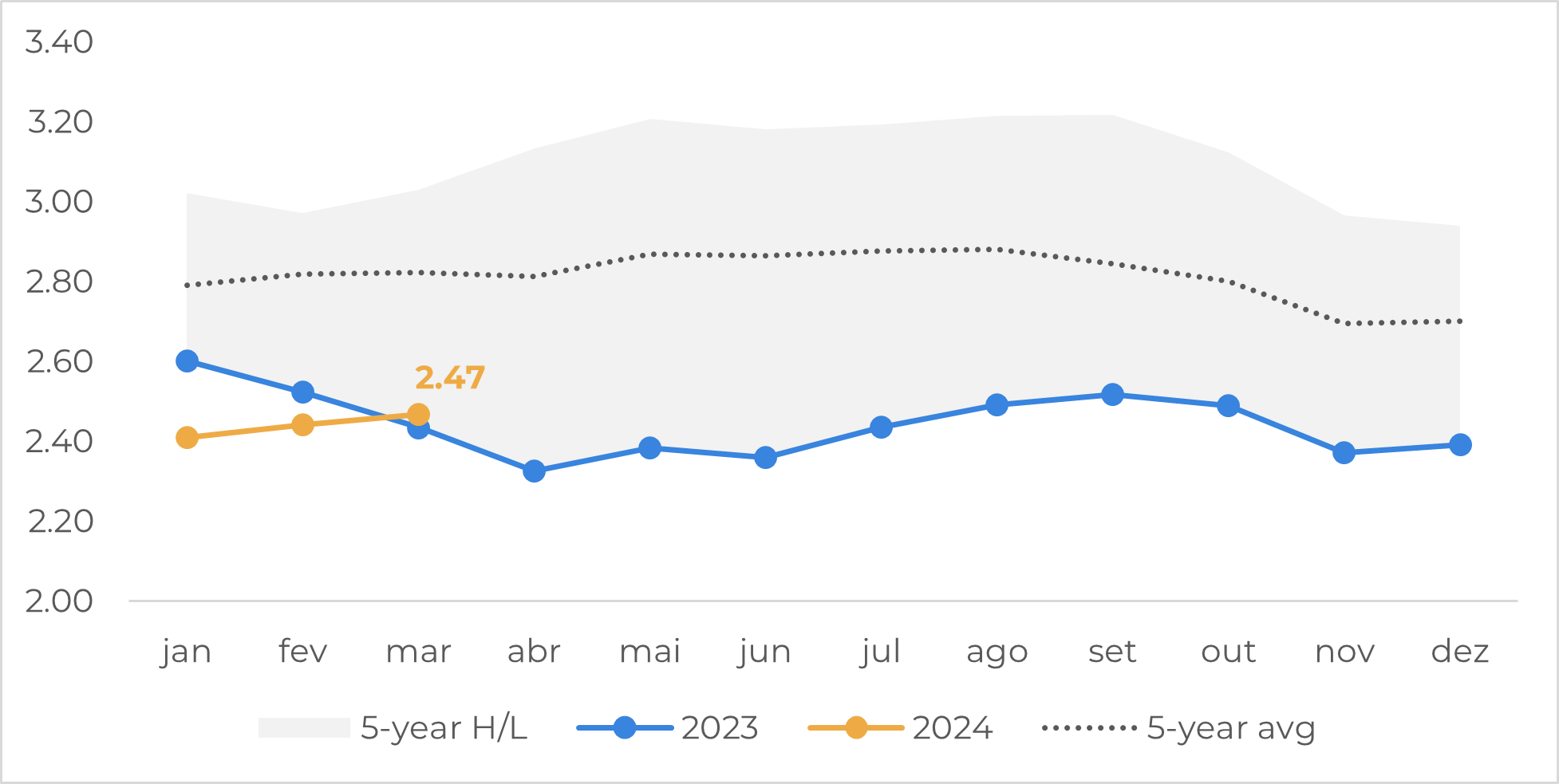
Source: JCA
Figure 2: Stocks by origin – Japan Coffee Association (‘000 bags)
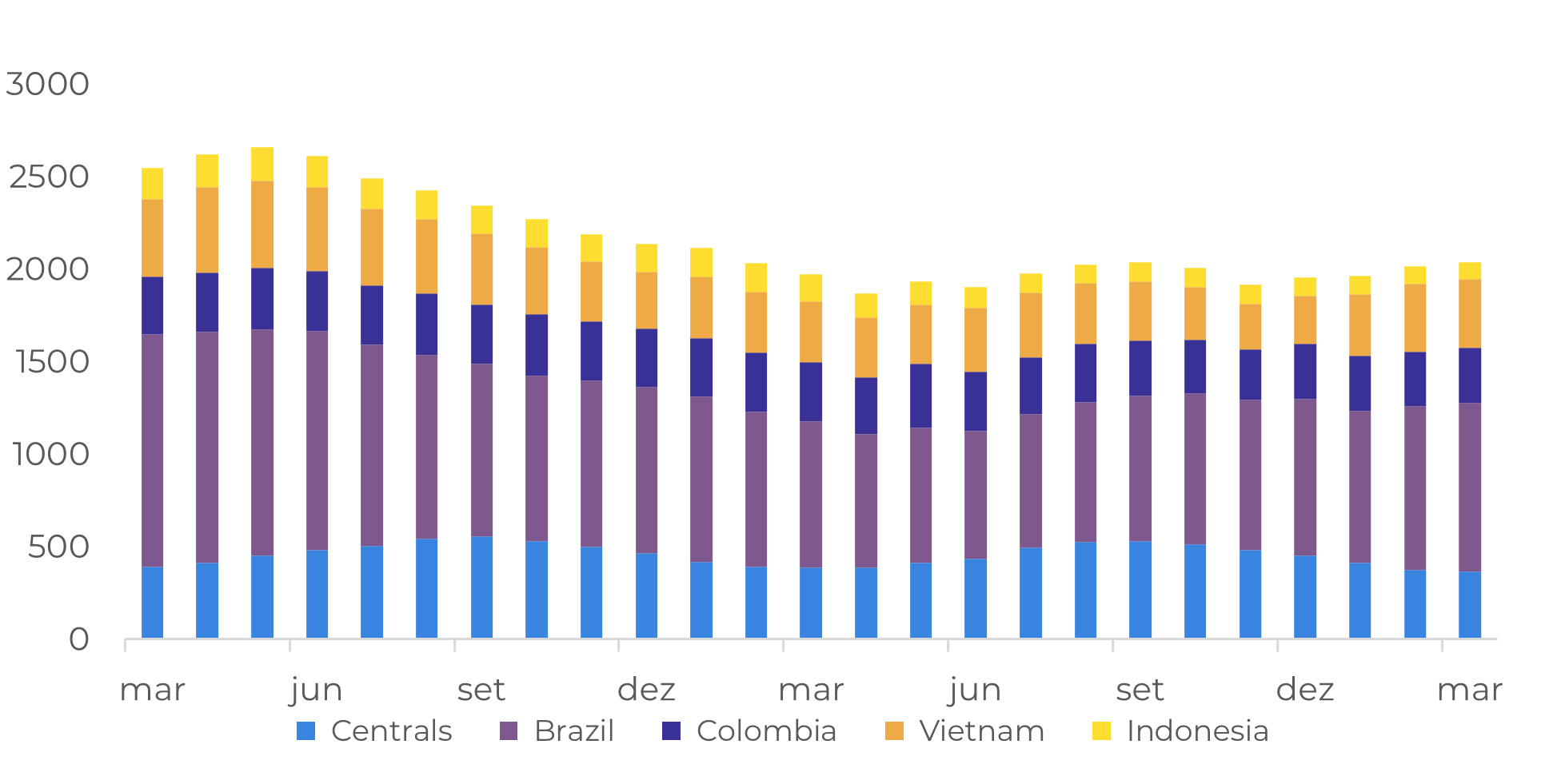
Source: JCA
Based on the more optimistic scenario of the two later indicators, we also expect a recovery in apparent demand compared to previous estimates. Cumulative demand for the first five months of the 23/24 season reached 2.58M bags, up 3.5% on the previous estimate and up 1.8% on the same period of the 22/23 season (Figure 3). While there may be changes in the trend, based on this scenario we could still see a positive correction in Japan's apparent demand for 23/24, which is currently expected to reach 6.18M bags this season. Finally, in terms of the type of coffee demanded, the trend for 23/24 remains towards a decline in the arabica mix. On another note, as previously stated in this analysis, we are still seeing a change in the origin of this coffee, with an increase in Brazilian beans.
Brazil's cumulative exports to Japan in the last 6 months have increased by 6.4% compared to the previous period, according to Cecafe. But while arabica exports to the Asian country increased by 5% during this period, conilon increased by 102.2%.
Figure 3: Aparent Consumption – Japan (M bags)
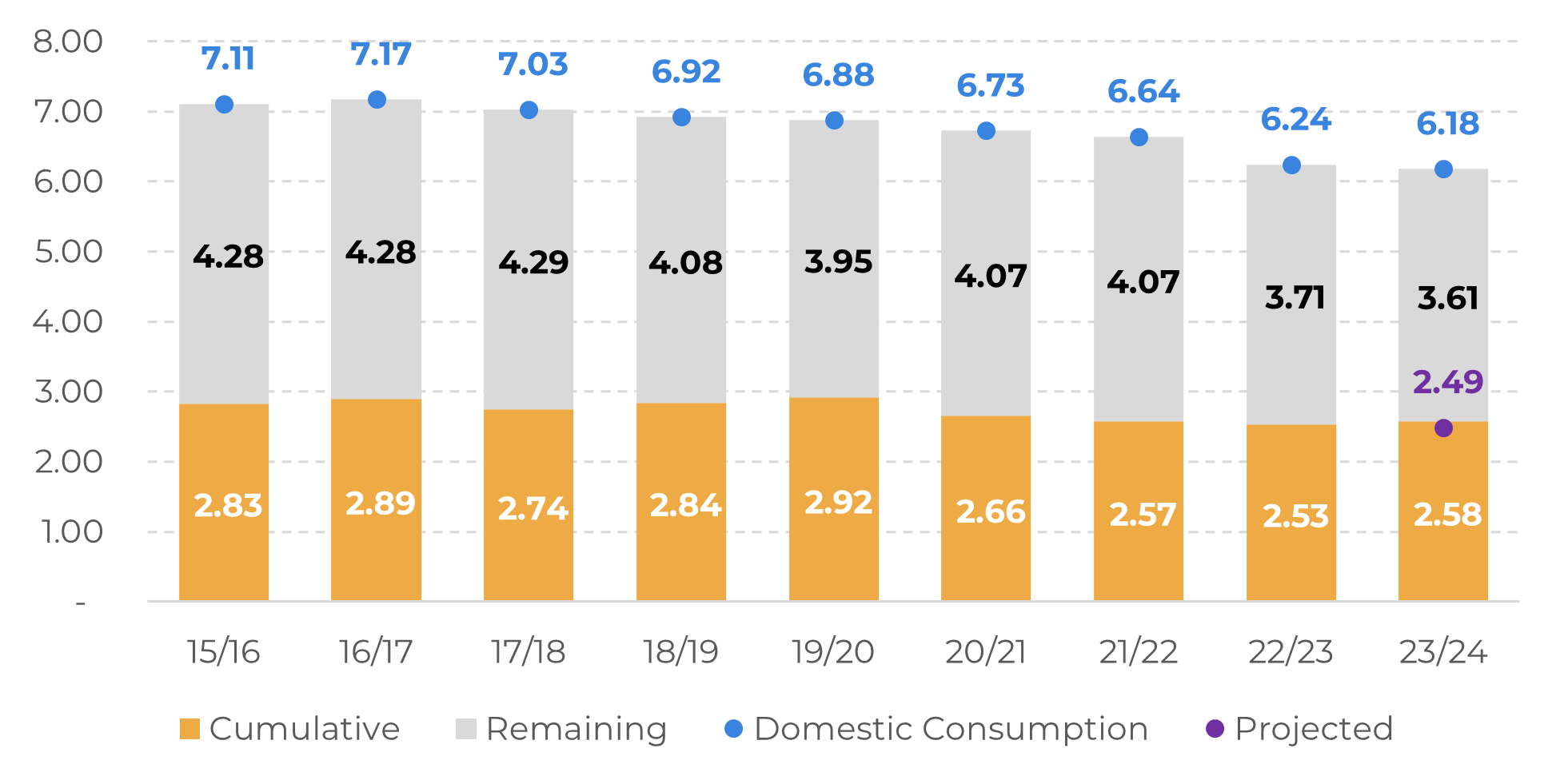
Source: JCA, HEdgepoint
The surge in Brazilian coffee is in line with the latest export figures published by Cecafe: green coffee shipments reached 3.90M bags in April, up 61% on the same period last year. The data confirms the trend of previous months, indicating that 2024 may end with higher Brazilian exports.
Arabica shipments totaled 3.22M bags, up 2.4% on March and 40.1% on last year. For Conilon, despite a 20.9% drop from March (the highest volume of the quarter), exports are still five times higher than the same period in 2023, to 676,7K bags, as Brazilian beans fill the gap left by Vietnam and Indonesia.
As the 24/25 harvest in Brazil gathers pace, exports tend to increase in the coming months, raising expectations. Finally, regarding 24/25 production, recent reports have highlighted concerns about bean processing yields. While it is too early to make concrete estimates, lower than expected rainfall in 2024 could have an impact on bean filling. In this sense, the market will closely monitor the development of yields as the harvest is about to peak in the following weeks.
Figure 4: Arabica green exports – Brazil (M bags)
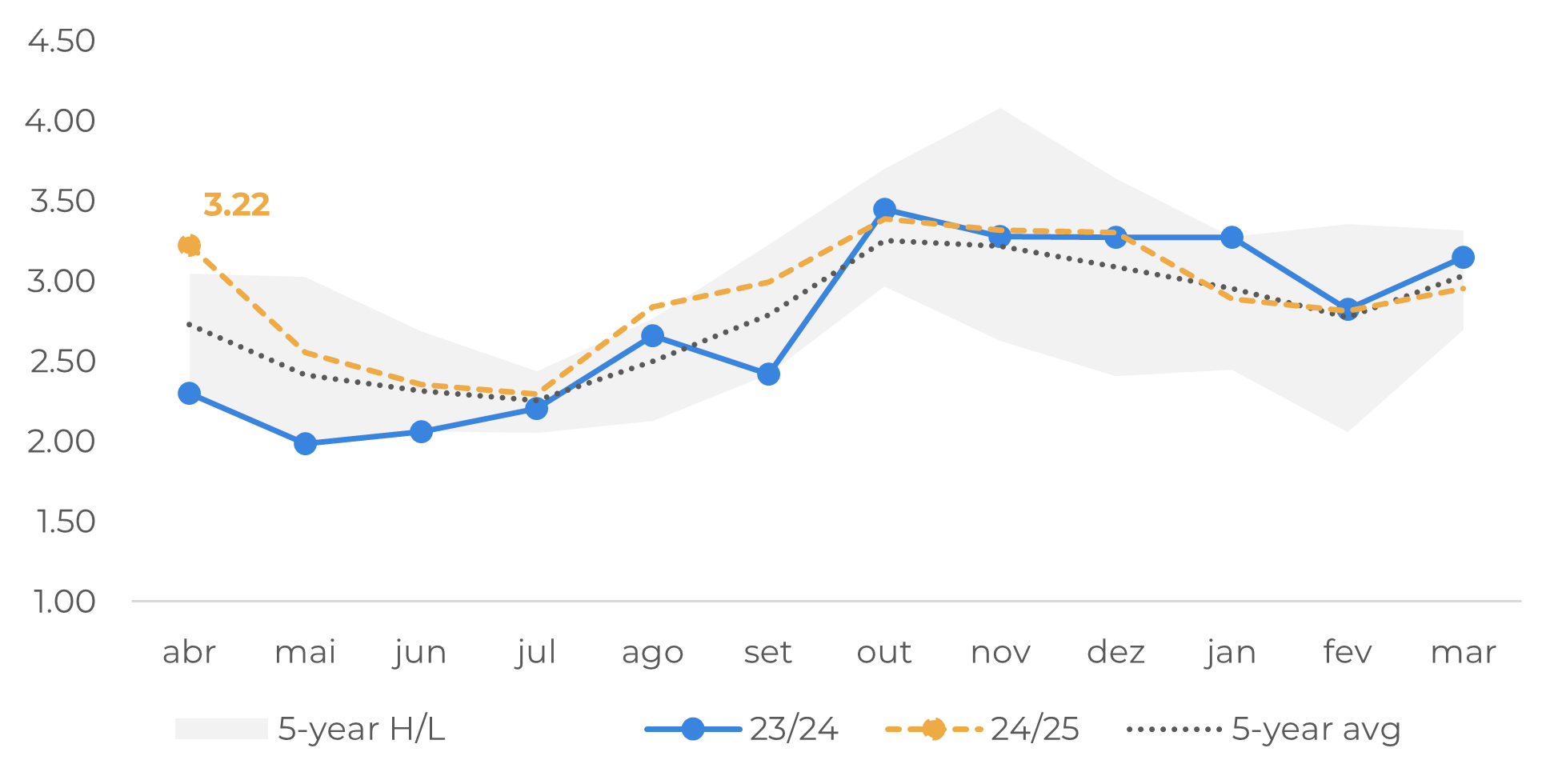
Source: Cecafe
Figure 4: Conilon green exports – Brazil (000’ bags)
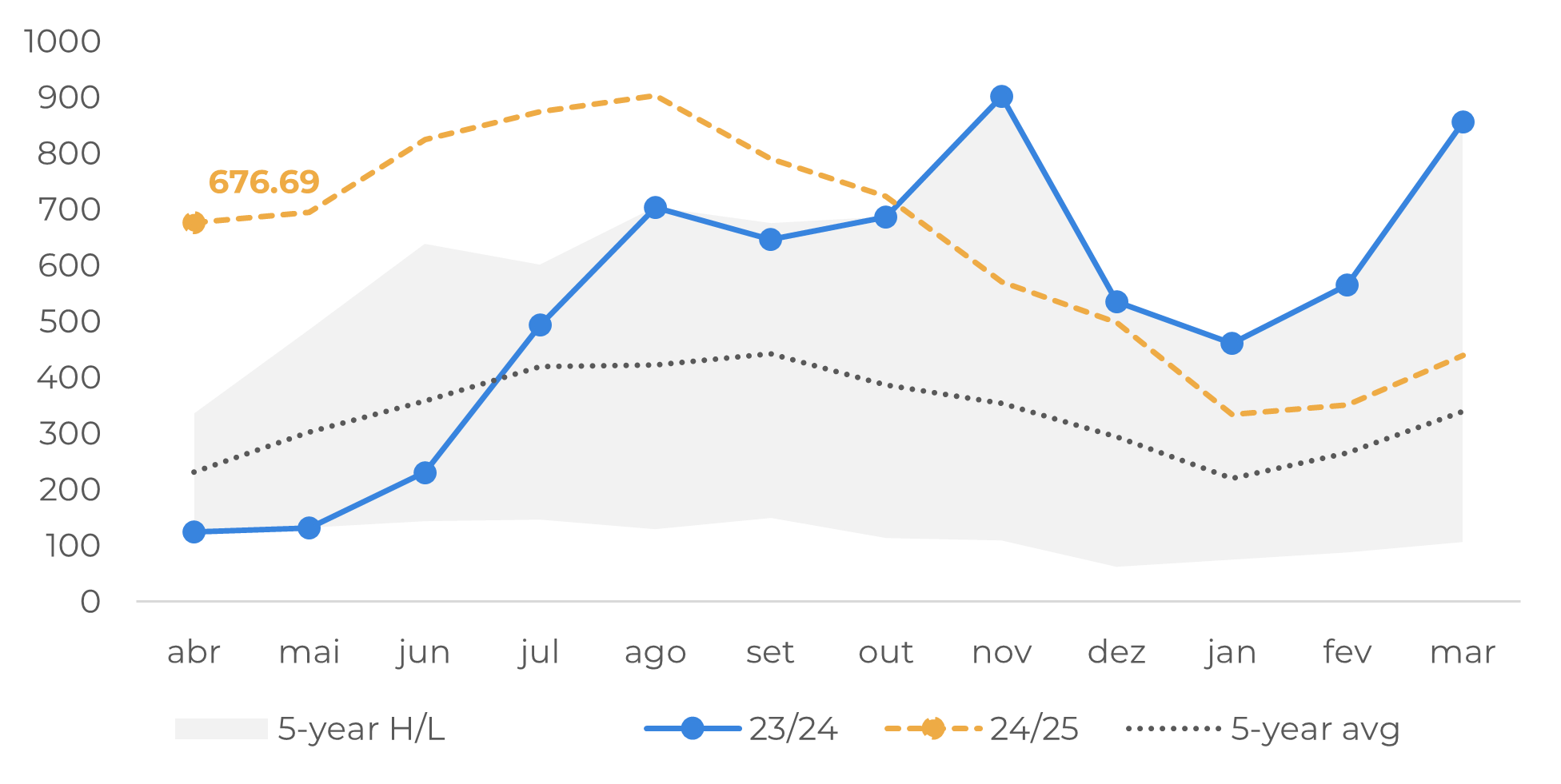
Source: Cecafe
In Summary
Data from the Japan Coffee Association points to a recovery in stocks, mainly supported by higher-than-expected imports in 23/24. Although these indicators are still lower than in previous years, the performance has been better than expected and could support a recovery in apparent demand in 23/24.
Brazil also plays a role in Japan's coffee import figures, as the former has increased its involvement as a supplier to the latter. Brazilian beans are currently in high demand in the market and will remain so, especially for the Conilon variety, given the decline in exports from Vietnam and Indonesia.
Weekly Report — Coffee
Written by Laleska Moda
laleska.moda@hedgepointglobal.com
laleska.moda@hedgepointglobal.com
Reviewed by Natália Gandolphi
natalia.gandolphi@hedgepointglobal.com
www.hedgepointglobal.com
Disclaimer
This document has been prepared by Hedgepoint Global Markets LLC and its affiliates (“HPGM”) solely for informational and instructional purposes, without the purpose of instituting obligations or commitments to third parties, nor is it intended to promote an offer, or solicitation of an offer of sale or purchase relating to any securities, commodities interests or investment products. Hedgepoint Commodities LLC (“HPC”), a wholly owned entity of HPGM, is an Introducing Broker and a registered member of the National Futures Association. The trading of commodities interests such as futures, options, and swaps involves substantial risk of loss and may not be suitable for all investors. Past performance is not necessarily indicative of future results. Customers should rely on their own independent judgement and outside advisors before entering in any transaction that are introduced by the firm. HPGM and its associates expressly disclaim any use of the information contained herein that directly or indirectly result in damages or damages of any kind. In case of questions not resolved by the first instance of customer contact (client.services@hedgepointglobal.com), please contact our internal ombudsman channel (ombudsman@hedgepointglobal.com) or 0800-878- 8408/ouvidoria@hedgepointglobal.com (only for customers in Brazil)
Contact us
hedgepointhub.support@hedgepointglobal.com
ouvidoria@hedgepointglobal.com
Funchal Street, 418, 18º floor - Vila Olímpia São Paulo, SP, Brasil
Check our general terms and important notices.
This page has been prepared by Hedgepoint Schweiz AG and its affiliates (“Hedgepoint”) solely for informational and instructional purposes, without the purpose of instituting obligations or commitments to third parties, nor is it intended to promote an offer, or solicitation of an offer of sale or purchase relating to any securities, commodities interests or investment products. Hedgepoint and its associates expressly disclaim any use of the information contained herein that directly or indirectly result in damages or damages of any kind. Information is obtained from sources which we believe to be reliable, but we do not warrant or guarantee the timeliness or accuracy of this information. The trading of commodities interests such as futures, options, and swaps involves substantial risk of loss and may not be suitable for all investors. You should carefully consider wither such trading is suitable for you in light of your financial condition. Past performance is not necessarily indicative of future results. Customers should rely on their own independent judgement and/or advisors before entering in any transaction.Hedgepoint does not provide legal, tax or accounting advice and you are responsible for seeking any such advice separately.Hedgepoint Schweiz AG is organized, incorporated, and existing under the laws of Switzerland, is filiated to ARIF, the Association Romande des Intermédiaires Financiers, which is a FINMA-authorized Self-Regulatory Organization. Hedgepoint Commodities LLC is organized, incorporated, and existing under the laws of the USA, and is authorized and regulated by the Commodity Futures Trading Commission (CFTC) and a member of the National Futures Association (NFA) to act as an Introducing Broker and Commodity Trading Advisor. HedgePoint Global Markets Limited is Regulated by the Dubai Financial Services Authority. The content is directed at Professional Clients and not Retail Clients. Hedgepoint Global Markets PTE. Ltd is organized, incorporated, and existing under the laws of Singapore, exempted from obtaining a financial services license as per the Second Schedule of the Securities and Futures (Licensing and Conduct of Business) Act, by the Monetary Authority of Singapore (MAS). Hedgepoint Global Markets DTVM Ltda. is authorized and regulated in Brazil by the Central Bank of Brazil (BCB) and the Brazilian Securities Commission (CVM). Hedgepoint Serviços Ltda. is organized, incorporated, and existing under the laws of Brazil. Hedgepoint Global Markets S.A. is organized, incorporated, and existing under the laws of Uruguay. In case of questions not resolved by the first instance of customer contact (client.services@Hedgepointglobal.com), please contact internal ombudsman channel (ombudsman@hedgepointglobal.com – global or ouvidoria@hedgepointglobal.com – Brazil only) or call 0800-8788408 (Brazil only).Integrity, ethics, and transparency are values that guide our culture. To further strengthen our practices, Hedgepoint has a whistleblower channel for employees and third-parties by e-mail ethicline@hedgepointglobal.com or forms Ethic Line – Hedgepoint Global Markets.Security note: All contacts with customers and partners are conducted exclusively through our domain @hedgepointglobal.com. Do not accept any information, bills, statements or requests from different domains and pay special attention to any variations in letters or spelling, as they may indicate a fraudulent situation.“HedgePoint” and the “HedgePoint” logo are marks for the exclusive use of HedgePoint and/or its affiliates. Use or reproduction is prohibited, unless expressly authorized by HedgePoint. Furthermore, the use of any other marks in this document has been authorized for identification purposes only. It does not, therefore, imply any rights of HedgePoint in these marks or imply endorsement, association or seal by the owners of these marks with HedgePoint or its affiliates.
We have updated our Terms & Conditions to reflect improvements to our platform, data handling practices, and the overall experience we provide to our clients.
To continue using the Hedgepoint HUB, please review and accept the updated terms.

